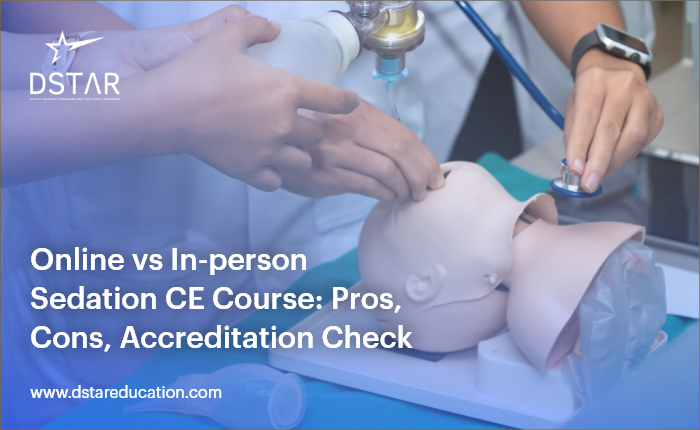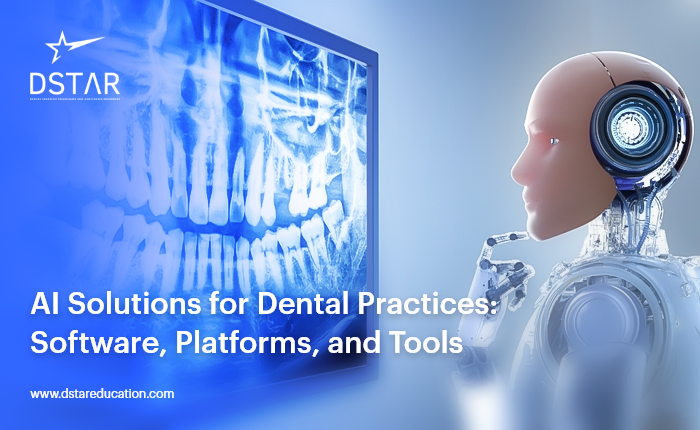BLS vs ACLS vs PALS—understanding the differences between these life-saving certifications is essential for every healthcare professional. Recent studies reveal that over 75% of dental emergencies involve either cardiovascular or respiratory complications, highlighting the urgent need for specialized training in these areas (Source: Journal of Dental Research).
In the dynamic field of dentistry, readiness for medical emergencies goes beyond professional responsibility; it’s integral to patient safety and care. DSTAR Education offers Basic Life Support (BLS), Advanced Cardiac Life Support (ACLS), and Pediatric Advanced Life Support (PALS) — each providing distinct levels of training tailored to meet the challenges faced in dental practices. Here, we explore each certification, discussing its relevance, implementation and importance.
Basic Life Support (BLS):
Basic Life Support, commonly abbreviated as BLS, is an essential certification for providing primary care to individuals experiencing life-threatening emergencies, particularly cardiac arrest and respiratory failure. This certification is recognized across various settings, emphasizing immediate response techniques that are essential in saving lives.
- Purpose of BLS: BLS training certification prepares individuals to quickly recognize several life-threatening emergencies, administer chest compressions, deliver appropriate ventilations, and use an automated external defibrillator (AED).
- Skillset Development: The course focuses on high-quality chest compressions, effective ventilations, and early use of an AED.
- Team Dynamics: BLS training certification also highlights the importance of working effectively within a team. This is particularly essential in a dental office where multiple staff members may respond to an emergency.
Who Should Obtain BLS Training Certification?
- Dental Assistants & Dentists: To manage and respond to patient emergencies effectively.
- Office Staff: To provide immediate response even before medical professionals arrive, ensuring that patients receive prompt care.
- Any Individual: There are no prerequisites for BLS, making it accessible to anyone interested in learning lifesaving skills. This inclusivity ensures that even those outside the healthcare sector can contribute effectively to emergency situations.
Detailed Skills Taught in Basic Life Support:
- Airway Management: Techniques to ensure that the airway remains open and clear. This includes positioning the patient properly to prevent airway obstruction.
- CPR Techniques: Administering chest compressions that are adequate in depth and rate, combined with effective ventilation. This helps in circulating oxygenated blood to vital organs.
- Use of AED (Automated External Defibrillator): Step-by-step guidance on using AEDs effectively to restore a regular heart rhythm during cardiac arrest.
Eligibility for BLS Training Certification:
Basic Life Support training is designed with universal access in mind, ensuring that anyone, regardless of their professional background, can learn important emergency response skills. To ensure effectiveness, periodic re-certification and training updates are recommended, keeping everyone’s skills sharp and responsive to the latest best practices.
Advanced Cardiac Life Support (ACLS) for Dentists:
Advanced Cardiac Life Support, or ACLS, builds upon the skills learned in BLS with more advanced procedures focused on adult patients. It’s designed for healthcare professionals who may need to respond to complex cardiovascular emergencies.
Advanced Skills Covered in ACLS:
- Recognition and Management of Arrhythmias: Identifying abnormal heart rhythms and applying appropriate interventions.
- Advanced Pharmacology: Knowledge of and ability to administer critical cardiovascular drugs.
- Effective Resuscitation Techniques: Enhancing skills in endotracheal intubation and use of other advanced airway devices.
Eligibility for ACLS: ACLS training certification is particularly recommended for dentists and dental anesthesiologists providing sedation, as these medications can lead to cardiorespiratory depression. This certification ensures that dentists are fully prepared to manage potential cardiovascular emergencies, enhancing comprehensive patient care capabilities.
Advanced Cardiac Life Support (ACLS):
Advanced Cardiac Life Support, often abbreviated as ACLS, is a specialized certification designed to enhance the skills of healthcare providers in handling severe cardiovascular emergencies, particularly in adult patients. This training is essential in settings where complex cardiac care is required.
Purpose of ACLS:
ACLS training certification equips dental professionals to manage acute cardiovascular emergencies through comprehensive strategies that include advanced airway management, recognition of life-threatening arrhythmias, and the appropriate use of pharmacological agents.
Skillset Development:
The program advances knowledge in:
- Pharmacological Interventions: Understanding and applying specific medications during cardiac emergencies.
- Advanced Cardiovascular Life Support Techniques: Utilizing sophisticated equipment and techniques to rescue and stabilize patients.
Team Dynamics:
ACLS emphasizes coordination and communication within healthcare teams, essential for managing a high-stakes environment like a dental surgery facility. While emergencies occur infrequently, perhaps preparing for these rare yet significant events is essential.
Who Should Learn ACLS?
- Dentists & Dental Anesthesiologists: Essential for effectively managing potential cardiovascular emergencies that can occur during procedures involving sedation.
- Dental Surgeons: Especially those who perform procedures under sedation or anesthesia that may increase the risk of cardiovascular complications.
Detailed Skills Taught in ACLS:
- Arrhythmia Recognition and Management: Skills to identify and treat severe cardiac arrhythmias.
- Advanced Airway Management: Techniques such as endotracheal intubation to secure the airway in emergencies, including cardiorespiratory failure. Intubation may be performed preemptively to maintain a patent airway and prevent the progression to an emergency situation.
- Pharmacology: Detailed knowledge of drugs used in the management of cardiac arrest and other cardiovascular emergencies.
Eligibility for ACLS Training Certification:
- Advanced Cardiac Life Support training is recommended for medical professionals who have a foundational understanding of cardiac life support, typically those who have already obtained BLS certification. This specialized training ensures that dental professionals are prepared to handle more complex scenarios and lead a team that are specific to adult patients.
Pediatric Advanced Life Support (PALS)
Pediatric Advanced Life Support, or PALS, is specifically tailored to prepare healthcare providers to effectively manage critically ill infants and children in emergency scenarios. This certification is important for dental professionals who provide care for the pediatric population.
Purpose of PALS:
PALS training focuses on the pediatric assessments and interventions that are necessary to manage acute pediatric emergencies effectively.
Skillset Development:
You will learn:
- Pediatric Assessment: A systematic approach to quickly identify and address the underlying causes of a pediatric emergency.
- Effective Respiratory Management: Techniques to ensure adequate breathing, which is critical for pediatric patients.
Team Dynamics:
Like ACLS, PALS training underscores the importance of teamwork in emergencies, teaching roles and responsibilities to ensure a coordinated response to pediatric emergencies.
Who Should Learn PALS Training?
- Pediatric Dentists: To address emergencies effectively in a child-specific context.
- Dental Professionals in Family Practice: Those who treat children alongside adults.
Detailed Skills Taught in PALS Training Certification:
- Advanced Resuscitation Techniques: Tailored for the physiological differences of children.
- Fluid and Electrolyte Management: Important in managing pediatric shock and dehydration.
- Advanced Airway Management: Pediatric-specific airway management strategies.
Eligibility for PALS Training Certification:
PALS training certification is designed for healthcare providers responsible for responding to emergencies in infants and children. This includes all dental professionals working in pediatric dentistry, who must have a foundational knowledge of basic life support mechanisms, as this training builds upon those core skills.
Comparing BLS vs ACLS vs PALS in Dentistry
| Certification | Target Audience | Key Focus | Skills Covered |
| BLS | Non-medical individuals | Basic emergency response | CPR, AED usage, basic first aid |
| ACLS | Healthcare professionals | Adult cardiorespiratory emergencies | Drug therapies, ECGs, advanced airway |
| PALS | Pediatric healthcare providers | Pediatric emergencies | Pediatric assessment, respiratory management |
Conclusion
Wheather its BLS vs ACLS vs PALS. Each of these certifications plays a pivotal role in ensuring dental professionals are prepared to handle emergencies efficiently. BLS serves as a universal foundation, while ACLS and PALS provide specialized knowledge essential for managing age-specific emergencies in a dental practice setting. Advance your expertise and ensure superior patient care by securing your certifications through DSTAR Education today.
References:
- Journal of Dental Research. Study on Dental Emergency Preparedness.
- American Heart Association. Training and Certifications.
- American Dental Association. CPR Requirements for Dentists.
- American Heart Association. Basic Life Support (BLS).
- American Heart Association. Advanced Cardiac Life Support (ACLS).
- American Heart Association. Pediatric Advanced Life Support (PALS).
 Take Free TSBDE Anesthesia Jurisprudence Practice Exam Now!
Take Free TSBDE Anesthesia Jurisprudence Practice Exam Now!












